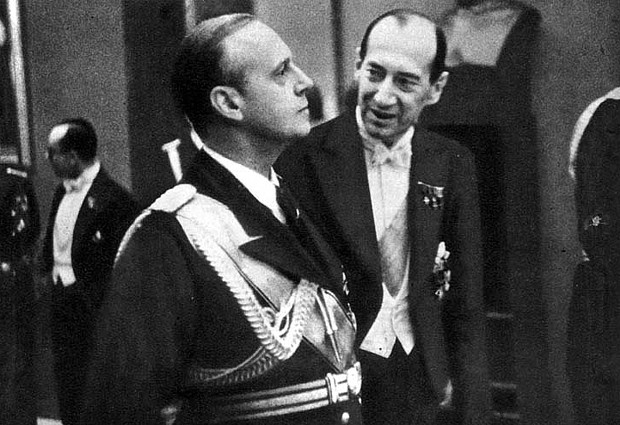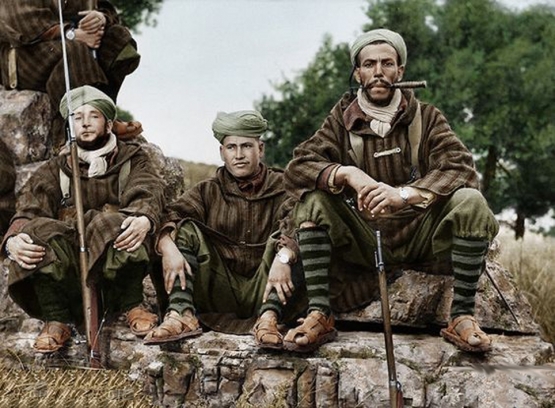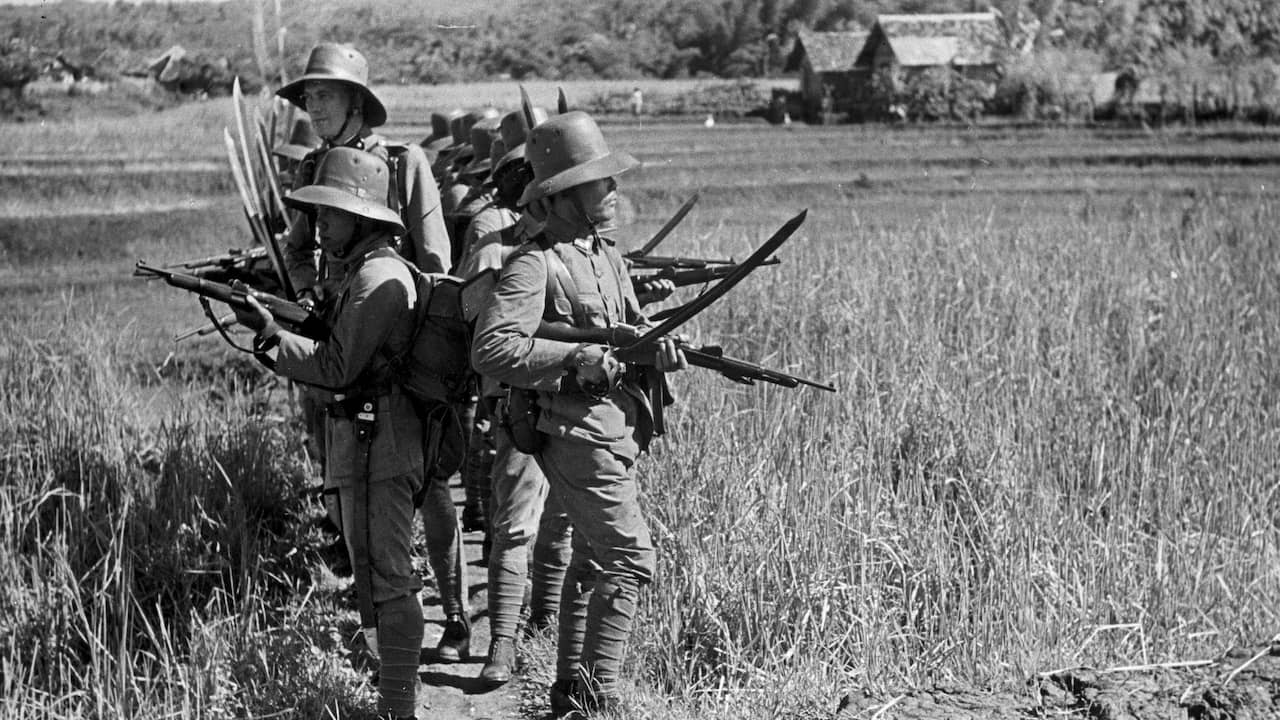8. And the rest of the world hadn’t stopped to watch [Part 1: Europe]
Polish Realignment: A Sarmatian Solution to Poland’s Perils?
Poland was an old nation but a young country. With the exception of Romania, every one of its neighbours had a claim to one part or another of its land. This considerably isolated Poland.
Poland’s foreign minister, Jozef Beck, had been an active participant in the Munich conference on Germany’s side. This gambit had gained Poland the Zaolzie region, and completely isolated Poland from the west.

Polish armour during the annexation of Zaolzie
Further complicating matters for Poland was its close relation with Japan. Poland had been tight lipped on the outbreak of the Anglo-Japanese War and only issued a belated call for restraint and diplomatic resolution. As a result the outbreak of the Anglo-Japanese War further divided Poland and the UK, and had the added detriment of meaning that Poland couldn’t hope for Japan to open up an eastern front should the Soviets move on Poland.
Polish diplomatic orthodoxy had always been to seek the assistance of France and the other western powers. However, as Munich had demonstrated, France’s adherence to its eastern alliances was conditional on British assistance. With Britain now at war in the east and France still chilly after Munich, it became apparent that no one in the west would come to their aid.
Poland had previously pursued the idea of a confederation of alliance of Europe’s minor powers. However, border disputes with Czechoslovakia and an unwillingness to accept Polish leadership meant that little progress had been made towards that goal.
Poland’s only option seemed to be to find accommodation in the schemes of one of the neighbouring great powers. The Soviet Union had nearly invaded Poland over the annexation of Zaolzie. That left Germany.
Germany had of course been Poland’s partner in the Munich Crisis. However, many of the same arguments brought up at Munich could just as easily be wielded against Poland. On the 6th of January 1939 Germany’s Foreign Minister, Joachim von Ribbentrop, pressed Beck on the matter of the Polish corridor. He demanded a firm commitment to the annexation of the Free City of Danzig and the establishment of an extraterritorial highway connecting East Prussia to the rest of Germany.
These terms would be a steep price to Poland. Even with the establishment of Gdynia,[1] the loss of economic rights in Danzig and the threat of the extraterritorial road being used to sever connections with the Baltic coast would give Germany a stranglehold on the Polish economy. Put on the spot, Beck carefully put off the matter by noting that he would need to consult with his government before committing, and suggested a conference at a later date to hammer out an agreement on the transfer of Danzig. That conference would end up being the Danzig Conference of the 11th of February, 1939.
Having successfully put off that matter, Beck shifted the topic to the expected fate of Czechoslovakia. After all, the Poles, as Sarmatians, wanted to stand alongside their fellow aryans.

Beck and Ribbentrop
Grave Uncertainty: The State of French War Planning
Were one to take an overview of French industrial output in 1939 one would likely get the impression that France was at war. In reality, this was very much not (yet) the case, but France was very clearly mobilizing it’s economy nearly as fast as it’s ally across the channel.
That Germany may try to take advantage of the UK’s distraction was not lost on politicians in Paris. In either a short or a long war the prospects for France alone to beat Germany seemed remarkably slim, demographics alone dictated that France stood little chance.
In lieu of quantity the French hoped quality could make do. That meant more tanks, more planes, more trucks, and more forts; and that meant more spending. Which was not an entirely repellent prospect to the ruling Socialists, as they had always intended to spend their way out of the great depression. The shift from buying surplus wheat to buying breakthrough tanks[2] was accomplished with minimal grumbling from the ruling coalition and the open support of the right wing opposition. Only the communists, who by this point existed only to state their disapproval in every government initiative, gave any dissent.
The French government also began new diplomatic initiatives. Overtures were made to Mussolini aimed at securing Italy’s neutrality in event of a Franco-German war, negotiations for their detente would drag on for months. On the on the 25th France signed the Bérard-Jordana Agreement, which shifted French diplomatic opinion from the moribund Republican cause to the Nationalist cause, and included a pact of nonaggression within its “declaration of good neighbourly relations”.
The military however was as confused and directionless as ever. Despite acquiring more tools for mobile warfare, it remained set on maintaining a defensive posture in what it anticipated would be a positional war.
The most immediate military actions France undertook were directed towards the security of its colonies near the war zone. While no great surge in troop numbers took place, a couple of mostly unassuming rotations positioned higher quality troops within the garrison. On the 11th of January a Moroccan Goum arrived in Haiphong to much fanfare and claims of “Mediterranean colour being brought to liven up the far east.” Officers were also shifted around to shake the rust out of the local military establishment, and the aged FT light tanks were complimented by new Panhard 178 armoured cars providing some much needed mobility and firepower to the garrison.

Moroccan Goumiers in the Central Highlands, despite appearances they had a reputation to be brave and dependable soldiers
The mobilization of French industry also benefited from British contracts, in particular for uniforms and logistical aid. French merchant and passenger ships played a part in the feverish movement of men and materials to Malaya and Australia that occurred in the first few months.
Dutch Neutrality Endangered: The January 13th Incident
Not only the Australian bush burned on Black Friday, but Dutch territorial water did as well. At 07:00 hours JST a Japanese merchant oil tanker was torpedoed as it left the port of Bula in the Dutch East Indies. The Japanese demanded an explanation of the Dutch, and threatened “additional precautions” while in Dutch territorial waters.
The Dutch government was alarmed by this. While the Dutch government had been taking some pro-British positions, it was in no way prepared to enter the war at this stage. A quick shakedown of the Koninklijke Marine confirmed that no Dutch ship was involved in the incident.[3]
Thus the Dutch foreign office had occasion to ring up their British counterparts. Which led the British foreign minister to approach Churchill to confirm what everyone was suspecting. The perpetrator was the submarine HMS Clyde acting on the admiralty’s directive to interdict Japanese oil shipments regardless of jurisdiction.
The Lord of the Admiralty came under criticism in Parliament for this overreach. However, Churchill was still untouchable after the fleet action off Borneo, and the arguments he presented about oil being Japan’s achilles’ heel were irrefutable. Still, trampling Dutch neutrality could not be permitted, and Churchill was forced to rescind the directive.
While the diplomatic matter passed swiftly enough, the incident had been a wake up call to the Dutch public who only now realized how precarious their neutrality was. As letters of concern poured in and demonstrations were held the conservative coalition running the Netherlands began to feel the pinch. No gradual build up or time spent waiting for new kit to be ordered and delivered would be acceptable to the electorate. The Netherland’s empire was in peril and only a surge of troops into the region would pass, efforts to maintain appearances and avoid a knee jerk reaction from Tokyo be damned.
That however raised issues of its own. The KNIL did not conscript troops and a recruitment drive would likely alert the Japanese before it would yield results. The Dutch conscript army constitutionally could not be deployed outside of Europe, which shut that avenue down. On the other hand, conscripts in the Korps Mariniers could be deployed overseas, though the KM was traditionally a smaller force. It was far from an optimal solution, but in 1939, all calls to serve would exclusively be to the Korps Mariniers.
The dubious constitutionality of this was noted. Those turning 18 that year were aware that the letters they received from the government weren't like the ones their older siblings and fathers had received. Still the matter went unchallenged, initially.
The Social Democratic Workers Party, still on its path of moderation, understood the public anxiety surrounding the January 13th Incident and understood that a misstep would paint themselves as unpatriotic. No, it was better to let the matter simmer, and launch a parliamentary challenge only once the public began to grow weary of its sons being cast off to the Indies. Instead they focused their criticism on the government's plans to procure capital ships from Germany. It argued that money should be spent in the Netherlands to the benefit of Dutch labourers,[4] rather than to fund Nazi militarism and oppression.

KNIL infantry with their eclectic kit.
---
[1] which had even eclipsed Danzig in volume of shipping.
[2] also finally achieved the government’s goal of lowering the cost of living, as the cost of food was finally not being artificially inflated in a period when workers were getting reduced hours.
[3] though many in the naval establishment, including Rear Admiral Conrad Helfrich seemed oddly excited by the turn of events and the funding increase they could expect as a result.
[4] optimally, though a new Rijkswerf rather than a private company.
A comparison of the January 13th Incident to the Attack on Hong Kong reveals quite a bit about the differences between the UK and Japan. In the UK, even if necessity mandates that barely a slap on the wrist is given (for now), the military isn’t permitted to overstep into the civil government’s domain (in this case, the foriegn ministry) and the government takes steps to mend fences after the incident. Whereas Japan’s civil government had for a few years now been little more than a rubber stamp for (not even particularly high ranking) officers.
Sorry for the long wait.
Poland was an old nation but a young country. With the exception of Romania, every one of its neighbours had a claim to one part or another of its land. This considerably isolated Poland.
Poland’s foreign minister, Jozef Beck, had been an active participant in the Munich conference on Germany’s side. This gambit had gained Poland the Zaolzie region, and completely isolated Poland from the west.

Polish armour during the annexation of Zaolzie
Further complicating matters for Poland was its close relation with Japan. Poland had been tight lipped on the outbreak of the Anglo-Japanese War and only issued a belated call for restraint and diplomatic resolution. As a result the outbreak of the Anglo-Japanese War further divided Poland and the UK, and had the added detriment of meaning that Poland couldn’t hope for Japan to open up an eastern front should the Soviets move on Poland.
Polish diplomatic orthodoxy had always been to seek the assistance of France and the other western powers. However, as Munich had demonstrated, France’s adherence to its eastern alliances was conditional on British assistance. With Britain now at war in the east and France still chilly after Munich, it became apparent that no one in the west would come to their aid.
Poland had previously pursued the idea of a confederation of alliance of Europe’s minor powers. However, border disputes with Czechoslovakia and an unwillingness to accept Polish leadership meant that little progress had been made towards that goal.
Poland’s only option seemed to be to find accommodation in the schemes of one of the neighbouring great powers. The Soviet Union had nearly invaded Poland over the annexation of Zaolzie. That left Germany.
Germany had of course been Poland’s partner in the Munich Crisis. However, many of the same arguments brought up at Munich could just as easily be wielded against Poland. On the 6th of January 1939 Germany’s Foreign Minister, Joachim von Ribbentrop, pressed Beck on the matter of the Polish corridor. He demanded a firm commitment to the annexation of the Free City of Danzig and the establishment of an extraterritorial highway connecting East Prussia to the rest of Germany.
These terms would be a steep price to Poland. Even with the establishment of Gdynia,[1] the loss of economic rights in Danzig and the threat of the extraterritorial road being used to sever connections with the Baltic coast would give Germany a stranglehold on the Polish economy. Put on the spot, Beck carefully put off the matter by noting that he would need to consult with his government before committing, and suggested a conference at a later date to hammer out an agreement on the transfer of Danzig. That conference would end up being the Danzig Conference of the 11th of February, 1939.
Having successfully put off that matter, Beck shifted the topic to the expected fate of Czechoslovakia. After all, the Poles, as Sarmatians, wanted to stand alongside their fellow aryans.

Beck and Ribbentrop
Grave Uncertainty: The State of French War Planning
Were one to take an overview of French industrial output in 1939 one would likely get the impression that France was at war. In reality, this was very much not (yet) the case, but France was very clearly mobilizing it’s economy nearly as fast as it’s ally across the channel.
That Germany may try to take advantage of the UK’s distraction was not lost on politicians in Paris. In either a short or a long war the prospects for France alone to beat Germany seemed remarkably slim, demographics alone dictated that France stood little chance.
In lieu of quantity the French hoped quality could make do. That meant more tanks, more planes, more trucks, and more forts; and that meant more spending. Which was not an entirely repellent prospect to the ruling Socialists, as they had always intended to spend their way out of the great depression. The shift from buying surplus wheat to buying breakthrough tanks[2] was accomplished with minimal grumbling from the ruling coalition and the open support of the right wing opposition. Only the communists, who by this point existed only to state their disapproval in every government initiative, gave any dissent.
The French government also began new diplomatic initiatives. Overtures were made to Mussolini aimed at securing Italy’s neutrality in event of a Franco-German war, negotiations for their detente would drag on for months. On the on the 25th France signed the Bérard-Jordana Agreement, which shifted French diplomatic opinion from the moribund Republican cause to the Nationalist cause, and included a pact of nonaggression within its “declaration of good neighbourly relations”.
The military however was as confused and directionless as ever. Despite acquiring more tools for mobile warfare, it remained set on maintaining a defensive posture in what it anticipated would be a positional war.
The most immediate military actions France undertook were directed towards the security of its colonies near the war zone. While no great surge in troop numbers took place, a couple of mostly unassuming rotations positioned higher quality troops within the garrison. On the 11th of January a Moroccan Goum arrived in Haiphong to much fanfare and claims of “Mediterranean colour being brought to liven up the far east.” Officers were also shifted around to shake the rust out of the local military establishment, and the aged FT light tanks were complimented by new Panhard 178 armoured cars providing some much needed mobility and firepower to the garrison.

Moroccan Goumiers in the Central Highlands, despite appearances they had a reputation to be brave and dependable soldiers
The mobilization of French industry also benefited from British contracts, in particular for uniforms and logistical aid. French merchant and passenger ships played a part in the feverish movement of men and materials to Malaya and Australia that occurred in the first few months.
Dutch Neutrality Endangered: The January 13th Incident
Not only the Australian bush burned on Black Friday, but Dutch territorial water did as well. At 07:00 hours JST a Japanese merchant oil tanker was torpedoed as it left the port of Bula in the Dutch East Indies. The Japanese demanded an explanation of the Dutch, and threatened “additional precautions” while in Dutch territorial waters.
The Dutch government was alarmed by this. While the Dutch government had been taking some pro-British positions, it was in no way prepared to enter the war at this stage. A quick shakedown of the Koninklijke Marine confirmed that no Dutch ship was involved in the incident.[3]
Thus the Dutch foreign office had occasion to ring up their British counterparts. Which led the British foreign minister to approach Churchill to confirm what everyone was suspecting. The perpetrator was the submarine HMS Clyde acting on the admiralty’s directive to interdict Japanese oil shipments regardless of jurisdiction.
The Lord of the Admiralty came under criticism in Parliament for this overreach. However, Churchill was still untouchable after the fleet action off Borneo, and the arguments he presented about oil being Japan’s achilles’ heel were irrefutable. Still, trampling Dutch neutrality could not be permitted, and Churchill was forced to rescind the directive.
While the diplomatic matter passed swiftly enough, the incident had been a wake up call to the Dutch public who only now realized how precarious their neutrality was. As letters of concern poured in and demonstrations were held the conservative coalition running the Netherlands began to feel the pinch. No gradual build up or time spent waiting for new kit to be ordered and delivered would be acceptable to the electorate. The Netherland’s empire was in peril and only a surge of troops into the region would pass, efforts to maintain appearances and avoid a knee jerk reaction from Tokyo be damned.
That however raised issues of its own. The KNIL did not conscript troops and a recruitment drive would likely alert the Japanese before it would yield results. The Dutch conscript army constitutionally could not be deployed outside of Europe, which shut that avenue down. On the other hand, conscripts in the Korps Mariniers could be deployed overseas, though the KM was traditionally a smaller force. It was far from an optimal solution, but in 1939, all calls to serve would exclusively be to the Korps Mariniers.
The dubious constitutionality of this was noted. Those turning 18 that year were aware that the letters they received from the government weren't like the ones their older siblings and fathers had received. Still the matter went unchallenged, initially.
The Social Democratic Workers Party, still on its path of moderation, understood the public anxiety surrounding the January 13th Incident and understood that a misstep would paint themselves as unpatriotic. No, it was better to let the matter simmer, and launch a parliamentary challenge only once the public began to grow weary of its sons being cast off to the Indies. Instead they focused their criticism on the government's plans to procure capital ships from Germany. It argued that money should be spent in the Netherlands to the benefit of Dutch labourers,[4] rather than to fund Nazi militarism and oppression.

KNIL infantry with their eclectic kit.
---
[1] which had even eclipsed Danzig in volume of shipping.
[2] also finally achieved the government’s goal of lowering the cost of living, as the cost of food was finally not being artificially inflated in a period when workers were getting reduced hours.
[3] though many in the naval establishment, including Rear Admiral Conrad Helfrich seemed oddly excited by the turn of events and the funding increase they could expect as a result.
[4] optimally, though a new Rijkswerf rather than a private company.
A comparison of the January 13th Incident to the Attack on Hong Kong reveals quite a bit about the differences between the UK and Japan. In the UK, even if necessity mandates that barely a slap on the wrist is given (for now), the military isn’t permitted to overstep into the civil government’s domain (in this case, the foriegn ministry) and the government takes steps to mend fences after the incident. Whereas Japan’s civil government had for a few years now been little more than a rubber stamp for (not even particularly high ranking) officers.
Sorry for the long wait.
Last edited: